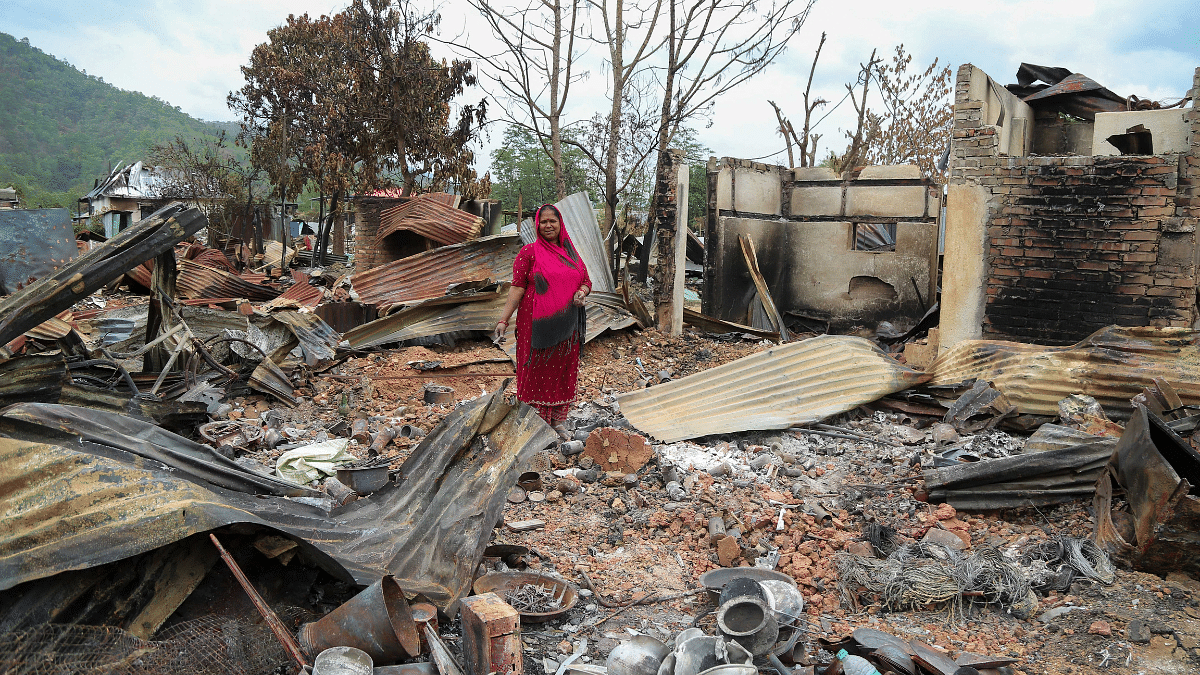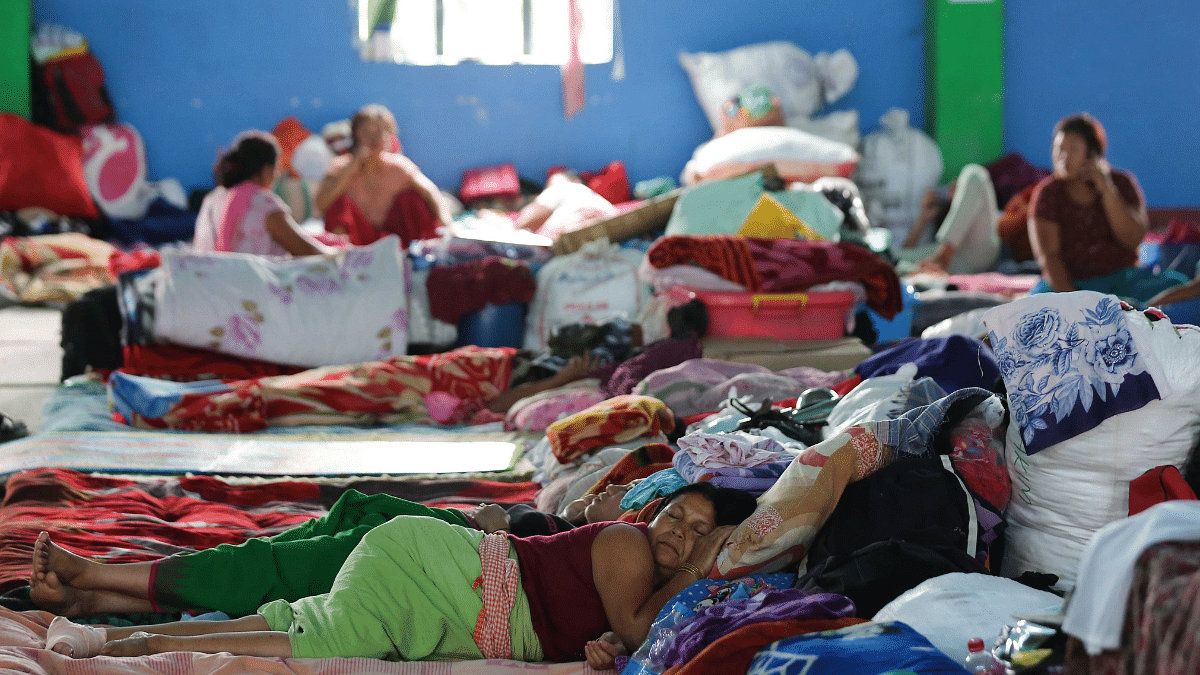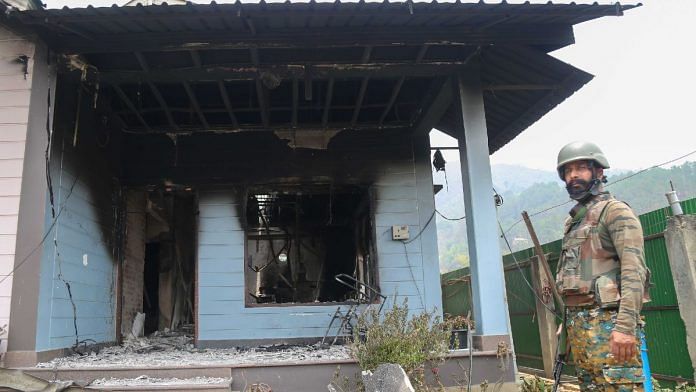Imphal: The immediate trigger behind the ethnic violence that rocked Manipur on 3 May could have been the Tribal Solidarity March to oppose the move to give Scheduled Tribe (ST) status to the Meitei community.
But mistrust between the tribal Kukis and non-tribal Meiteis had been building up for a while, over several issues, local politicians, civil servants, and civil society voices from both the communities told ThePrint.
While there is a growing apprehension among the Meiteis over what they allege are “demographic changes” in the Hill districts, where the tribals live, the Kuki political and civil leadership says the BJP government led by Chief Minister N. Biren Singh, who belongs to the majority Meitei community, has been trying to push the “majoritarian” agenda.
To this end, they cite certain actions taken by the state government. For instance, the decision in March to clear alleged encroachments from reserved and protected forests where the Kukis live or cultivate poppy, from which opium is derived.
The administration described the decision as a bid to save forest land and crack down on drugs. But members of the Kuki community claim that while they oppose poppy cultivation, what makes them suspicious is the fact that the crackdown is allegedly focused on areas they inhabit.
The Biren Singh government’s announcement that they are working on implementing the National Register of Citizens (NRC) has been resented as well.
Paolienlal Haokip, a Kuki BJP MLA from Saikot in Churachandpur district, said the government’s anti-encroachment drive was one of the many triggers in the last one year that have kept ethnic tensions simmering.
Haokip told ThePrint that “chiefs of Kuki villages that have existed on the reserved forests since much before the Forest Act, 1927 [which covers, among other things, the rights of people to live in forests, and to forest produce], came, were not even given a chance to claim the pre-existing rights of their territory under the law”. Due process was not followed, he said.
“While the government is evicting the Kukis for encroaching on reserved forest, there have been no evictions in similar protected forests in Langol, on the periphery of Imphal valley, where a large population of Meiteis lives. Similarly, there have been no evictions in the Naga villages of Senapati and Ukhrul,” he said.
The demand for the ST tag for Meiteis is described as the last straw.
While the Meiteis are largely Hindu, the Kukis are tribal Christians and, along with the Nagas and other tribes, are categorised as STs.
The solidarity march came in light of a Manipur High Court order that asked the state government to recommend the ST tag for Meiteis to the Centre.
The Meiteis say they were historically categorised as a tribe, and cite the campaign for an ST tag as a bid to secure constitutional safeguards for the community. However, the Kukis see it as an assault on their rights.
With “such kind of action”, Haokip said, “one cannot help if people perceive it as targeted”.
“The narrative that is being built is that Kukis are land-grabbers. I am not surprised that there is anger, discontent, and distrust,” he added.
Over the past few days, several Kuki politicians have blamed groups such as Arambai Tenggol and Meitei Leepun — described by Kukis as “radical” organisations — for instigating the tribals participating in the solidarity march on 3 May.

“There are videos showing how young men from these radical groups indulged in arson and vandalism. Who was behind them? The government should investigate,” said W.L. Hangshing, general secretary of Kuki People’s Alliance (KPA), one of the allies of the BJP government in the state.
ThePrint reached CM N. Biren Singh for comment through phone calls but failed to get a response. A. Sharda Devi, BJP state president, refused to comment.
Kuldiep Singh, security adviser to N. Biren Singh, said there were “a host of issues because of which there is a mistrust between the Meiteis and the Kukis”.
“One of our priorities now is to build their confidence so that they go back to their home,” he added.
Resentment on both sides
If the Kukis have felt targeted by the state government’s actions, resentment has been brewing among the Meiteis, too, over what they describe as “demographic changes” in the Hill districts.

The Meiteis say the “spurt” in Kuki population over the years could result in lowering the representation of non-tribals in the state assembly once the delimitation exercise in Manipur, on hold until 2016, starts.
Manipur’s population, according to the Census 2011, is 28 lakh. Of this, the Meiteis comprise 15 lakh, while the Kukis number around 8 lakh. The Nagas account for 6 lakh, while other communities make up for the remaining population.
Politics in Manipur is currently dominated by the Meiteis.
The representation in the 60-member Manipur assembly stands at 2:1, where the general category — including the Meiteis — can contest from 40 seats while 20 are earmarked for tribals.
Since Manipur became a state, all but two of its CMs have been from the Meitei community. The two who weren’t — Yangmaso Shaiza & Rishang Keishing — are Tangkhul Nagas.
Arambam Noni, assistant professor in the Department of Political Science at Dhanamanjuri University, Manipur, said there was a general discourse in the state that the porous border between Myanmar and India, along with the continuing instability in Myanmar, has resulted in “large-scale illegal movement of Kuki-Chin tribals to Manipur”.
The Kuki-Chin tribals of Myanmar hold close ties with the Kukis across the border in India. Several Myanmarese nationals are believed to have fled the nation in light of a brutal crackdown by the military, which seized power in a 2021 coup, on protests against the junta.
“There are government statistics that show there are places in Manipur that have seen 100 per cent decadal population growth,” said Noni. “So, if you are saying that there are certain pockets in the state, which are seeing more than 100 per cent population growth, especially in Hill districts… how has this come about?” he added.
A civil servant in the state government, a Meitei, told ThePrint that the concern of the Meiteis over “demographic changes” is real.
“What happens when the delimitation commission recommends that, based on the increase in population of tribals, there should be a rejig in the proportion of tribals and non-tribals in the state assembly?” the civil servant said, on the condition of anonymity. “This is not acceptable to the Valley (Imphal) people. This will impact everything. Even reservation for jobs in the state government will change.”
According to Kuki leaders, it is this “perceived threat” — that the tribal population has increased manifold in recent years — that is being used by the Biren Singh government to target them and “peddle his majoritarian politics”.
“Violence is a result of longtime simmering discontent,” Hangshing of the KPA said.
Thongkholal Haokip, assistant professor at the Centre for the Study of Law and Governance, Jawaharlal Nehru University (JNU), said the reason the Biren Singh government “is pursuing the majoritarian agenda and targeting the Kukis is because he is afraid that all the tribals will come together and they will not be able to counter them”.
“He is playing the divide-and-rule policy. That is the reason he is not targeting the Nagas,” he said.
That explains, he added, why he is going after evicting Kukis living in reserved and protected forests. “Similar encroachments are there in Naga and Meitei areas, too. Why are they not being evicted from reserved forests?” he asked.
MLA Haokip said the BJP government led by Biren Singh had pushed the tribals into a corner.
“There have been real and perceived discriminatory occurrences against the Kukis over several issues in the recent past. The way the tribals are being portrayed as poppy cultivators and illegal immigrants are just two such instances,” he said. “This has caused a lot of heartburn in the community.”
Hangshing, a retired Indian Revenue Service officer, said the reason the Kukis were being cornered is the geography of Manipur.
“The foothills surrounding Imphal encompass the Valley, and the Kukis live in the foothills. The Meiteis’ grouse is that they cannot buy tribal land here. So, they want ST status,” he said. “They do not want to go to the Hills and buy land. They want to buy in the foothills as the Valley has become congested.”
It is indeed among the complaints of the Meiteis that the law permits the tribals to buy land in the Valley, but they (Meiteis) cannot buy land in the Hill districts, which are inhabited by the tribals.
Besides, they say, the ST status for tribals also gives them a clear edge over the Meiteis in getting government jobs.
“If you see the civil and the police administration, it’s mostly the Kuki officers who dominate the top positions in the police and government today because they get the benefit of reservation,” a second civil servant, also a Meitei, said.
Also Read: ‘What if it happens again?’ No violence in 5 days, but distrust grips Manipur, fear haunts victims
The poppy link
Meitei politicians in the state, who have their differences with the Biren Singh government on other issues, say the action against poppy cultivators in the Hill districts is an appreciable move.
Y. Joykumar Singh, who served as deputy CM in the first term of the Biren Singh government, told ThePrint that commercial exploitation of poppy “at the scale at which it has been happening for the past few years in the Hill districts was not there before”. “The drug money is being used to fuel insurgency in the state,” he said.
Singh, who is a leader of the National People’s Party (NPP), said that Manipur is “slowly descending into a narcotic zone, which has become a big concern in recent times”.
“We are fearful for our youths because they might now get completely bogged down by this new economy,” he said.
One of the state government officials quoted earlier said that poppy cultivation is higher in Kuki areas.
Prof Noni said that the drug economy “has been meticulously designed to infiltrate into acquiring political power”.
“Where will you use this profit gathered from the drug economy? This is the question. It is clear that this massive economy, which is mobilised from drug plantation, is going to be used for either enhancing ethnic politics or to acquire political power,” he added. “These anxieties cannot be ruled out in the context of present tension in Manipur.”
Nagas watching silently
The violence that rocked Manipur on 3 May, claiming close to 60 lives, was confined to Kukis and Meiteis, government officials told ThePrint.
The Naga community has stayed out of it.
Ashang Kasar, a Naga social activist, said that, at present, the community is observing the developments silently. “Nagas also oppose ST demand for Meiteis. Nagas are supporting Kukis, though we have differences with Kukis on other issues,” he added.
(Edited by Sunanda Ranjan)
Also Read: ‘Violence by Meiteis partitioned Manipur’ — 10 Kuki MLAs demand separate administration for tribals



